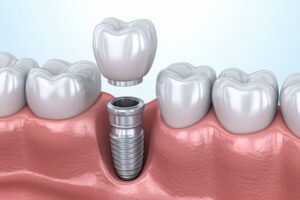
Dental implants are widely regarded as the gold standard for tooth replacement because of their durability, function, and natural appearance. While the success of a dental implant depends on factors like oral hygiene and surgical skill, one critical aspect that’s often overlooked is the material used in the implant itself. The choice of material plays a major role in how long your dental implant will last and how well it will perform. Let’s explore how different dental implant materials affect the lifespan of your implant and what you should know when considering your options.
Titanium: The Tried-and-True Standard
Titanium has been the go-to material for dental implants for decades, and for good reason. It’s strong, lightweight, biocompatible, and has a remarkable ability to fuse with bone, a process called osseointegration. This integration creates a stable foundation for the crown and mimics the natural root of a tooth.
With proper care, titanium implants can last 20 years or more, and many last a lifetime. Their durability and resistance to corrosion make them ideal for long-term performance. Clinical studies consistently show success rates above 95 percent over 10+ years.
Some people express concerns about having metal in their body or may have rare allergies to certain alloys used in titanium implants. In such cases, other options may be explored.
Zirconia: The Metal-Free Alternative
Zirconia dental implants are a newer, ceramic-based option that’s gaining popularity. They are tooth-colored, making them ideal for people who want a more natural look, especially in the front of the mouth. Zirconia is also biocompatible and has low plaque affinity, reducing the risk of gum inflammation.
Zirconia implants are durable, but they may not yet match the long-term track record of titanium. Studies suggest a lifespan of 10 to 15 years with proper care, though newer generations are showing promise for even longer durability.
Because zirconia is a single-piece design (as opposed to titanium’s two-piece system), it may offer less flexibility in certain clinical situations. Additionally, zirconia is more brittle than titanium and may be more prone to fracture under heavy biting forces.
Abutment and Crown Materials Matter, Too
It’s not just the implant post that determines the overall success – the abutment (connector piece) and the crown placed on top also impact the implant’s lifespan.
- Abutments can be made from titanium, zirconia, or even gold. Each material has different strengths and esthetic qualities.
- Crowns are typically made from porcelain, zirconia, or porcelain-fused-to-metal (PFM). Zirconia crowns are highly durable and aesthetically pleasing, making them a popular choice for implant restorations.
Choosing the right combination of materials can increase the longevity of your entire implant system and enhance both function and appearance.
The materials used in your dental implant aren’t just technical details; they’re crucial to its long-term success. Titanium remains the most time-tested and durable, while zirconia offers a strong, metal-free alternative for those with specific needs. Discussing material options with your dentist ensures your implant not only lasts but also looks and feels just right. With the right choice and proper care, your implant can be a lifelong investment in your oral health.
About the Author
Dr. Francisca A. Sanchez has been in practice for more than 20 years. She is a graduate of the Columbia School of Dental Medicine and received state-of-the-art training in dental implant placement from the University of Florida. Today, Dr. Sanchez is a member of the New York Dental Association and the American Dental Association. If you’re ready to transform your smile and functionality with dental implants, schedule your appointment online or call us at (646) 669-7407.
